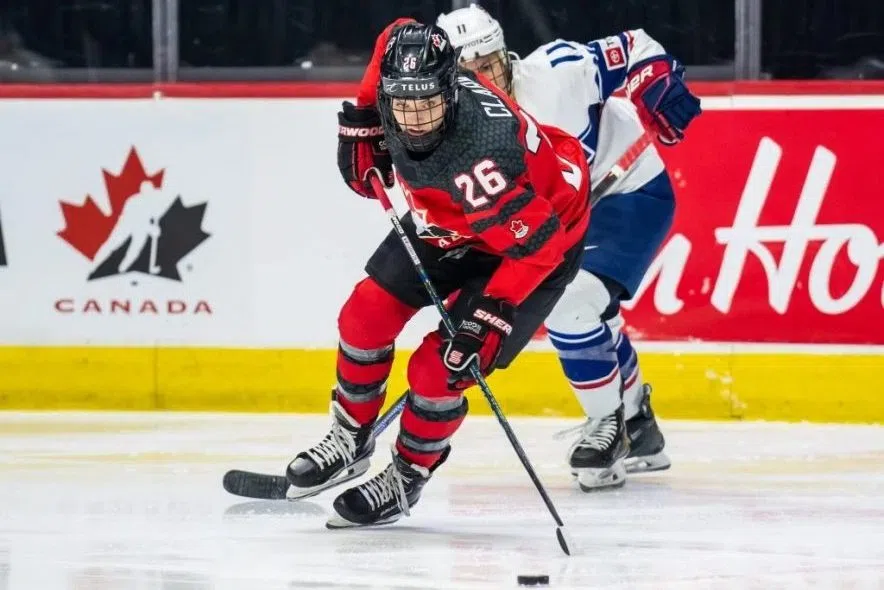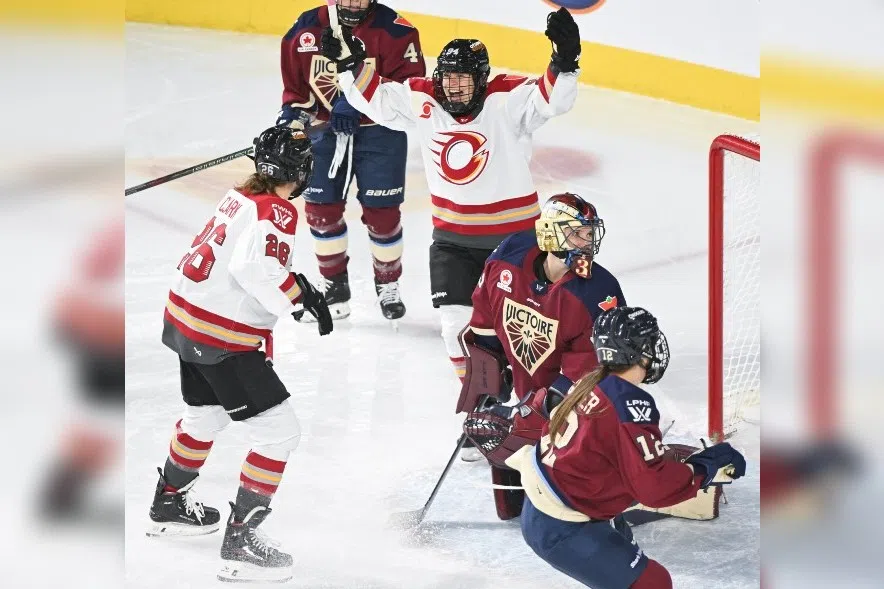Emily Clark is feeling the momentum building for the Professional Women’s Hockey League (PWHL).
The Saskatoon product has seen the league go from an idea to it’s second season of play.
“Kind of just strapped in and along for the ride,” the Ottawa Charge forward told Jamie and Locker on The Green Zone.
Read more:
- Still no timeline for when Weyburn rink could re-open after ammonia leak
- Moose Jaw Warriors trade Brayden Yager in blockbuster deal
“It was a bit of a roller coaster last year just with it being a bit of a marathon that turned into a sprint to get this thing going.
“I think we had confidence that it would do super well, but expectations were definitely blown out of the water and you can feel that momentum — not just behind our league, but women’s sports globally. So I think we’re just in a pretty sweet spot in time and there’s only bigger and better things to come this season.”
One of the biggest changes for the league this year has been the addition of team names and logos after just going by city names the first year of the league. Along with the Charge, there is the Boston Fleet, Minnesota Frost, Montreal Victoire, New York Sirens, and Toronto Sceptres.
“It’s so fun. That was a big talk last year (about team names and logos) and people were getting a bit impatient. I don’t blame them. As players, we were just happy to be playing and competing,” Clark said.
“I didn’t care what was on my jersey. It is nice now to have a team name, and a bit of an identity. Last year, there was so much talk about everything being the first and the inaugural and it was so special to be a part of that history, but I think it’s nice now that everyone and each team has their own identity. Each team can carve out their own history that separates them from other teams. So I think that’s kind of a fun part.”
Clark scored a goal in Ottawa’s first game of the season on Saturday — the first point tallied by a player since the team branded as the Charge.
🚨 Emily Clark (1)
🍎🍏 Unassisted pic.twitter.com/heB4WvElUK— Ottawa Charge (@PWHL_Ottawa) November 30, 2024
Clark has also enjoyed the physical aspect of the league this season.
“I’m a Sask. girl — I grew up with four older brothers. I’ve been kind of waiting my whole career for a bit of a green light to play a bit more physical, and that’s exactly what the PWHL has allowed everyone to do. I’m quite enjoying it myself,” Clark said.
Clark has been a fixture on the national team which earned two Olympic medals — gold in 2022 and silver in 2018 — and has won the world championships three times.

Emily Clark scored a goal as Canada defeated the Americans 3-0 at the Brandt Centre in February 2024. (Dave Holland/Hockey Canada)
While trying to get a unified women’s league up and running as a member of the Pro Women’s Hockey Player’s Association, Clark’s family was her biggest supporter.
“They’ve been there every step of the way, and they’ve wanted this is bad for me as (all the players) have, so from my parents through my brothers, my sister, the in-laws, everyone’s been so invested in this and I think it’s been really fun for them to have a front row seat to it all as well,” Clark said.
The league is also now giving younger women hockey players the chance to play somewhere after college, including Danielle Serdachny.
Serdachny, who played for Princeton University, was taken by the Charge second overall in the 2024 draft. She has already been a teammate of Clark’s on Team Canada, and scored the gold medal-winning overtime goal against the United States at the 2024 IIHF Women’s World Championship.
“It’s been a blast getting to have Dachs around. I’ve played with her for a few years on the national team and obviously, she scored some big goals for us — especially the overtime winner last year. But I think being able to see a player like her every day is definitely eye-opening — just her skill, attention to detail, and how much she’s really working at her game every single day,” Clark said.
Now into the second PWHL season, Clark and the Charge will look to make playoffs after narrowly missing them last season.
With how close they came, Clark knows every point matters during a season where a win in regulation gives a team three points, and then they are split if games go to overtime.
“I don’t think anyone will know that more than us and Minnesota. Obviously, them getting in by a point, us losing out by a point. Definitely a big lesson and curve and the point system — three points for a regulation win and splitting the points in any overtime — makes for really competitive hockey. Things can change on a dime but every point really matters as we found out,” Clark said.











